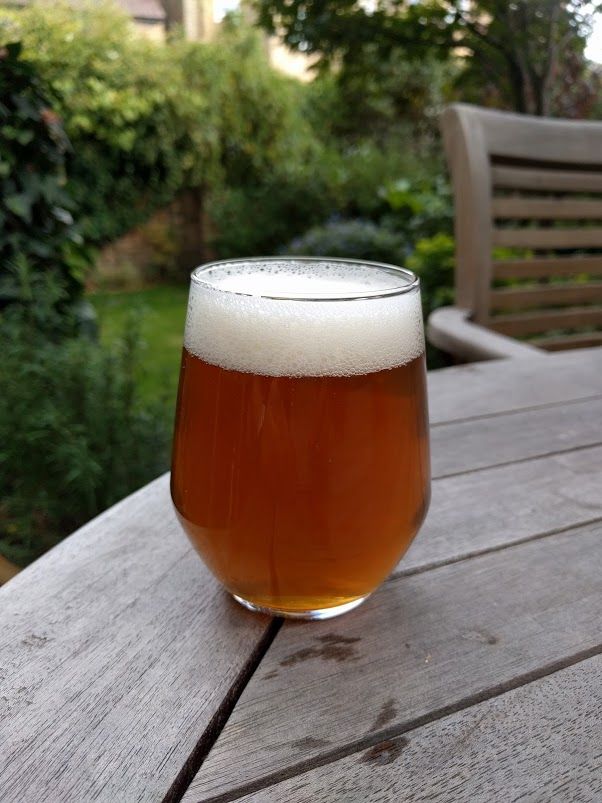#31 Rudyard's Marmalade Breakfast No. 3

It had been some time since my last attempt to brew the liquid version of marmalade on toast, and the quest for the ideal marmaladey hop continues. This time I thought I would try Summit hops.
This brew also marked a total departure from brewing in a bag, having first bought a 48 litre Igloo chest cooler and converted it to a mash tun, and now replaced the voile "bag" (a generous description - it was actually just a big sheet tied into an ugly knot) with a copper manifold after a few brews with very shoddy extraction.
The other element of trying to improve my poor efficiency was reducing the volume of hot water that went into the mash and keeping more back for the sparge (2.5 litres per kilo of grain seems to be standard; I'd been using as much as 4). So I heated 15 L of water to 75 C and added it to mash tun. This was slightly higher than what Brewer's Friend said I needed, so I waited until it reached 73 C and then mashed in 6kg of Maris Otter from the good people at UBREW. It seemed worryingly thick to me, but I suppose it would do given how much water I had been using. I stirred for a while to remove clumps until it reached 65 C then mashed for 90 minutes (I meant to mash for 60 minutes but a friend turned up late for dinner, so it got the full hour and a half while I fulfilled my social duties). I then put 18 L of sparge water in the boiler and set it to heat.
This is when the fun began - a fucking stuck sparge! Being new to this, as soon as I was ready to collect wort, I cranked the tap open and watched as pretty much nothing came out. Not good, I thought. I'd been wary that the out tube on the manifold was only loosely connected to the tap, and thought that I may have nudged it while stirring, letting grain into the tap. So I put some silicone gloves on, cursing, and tried to jimmy the manifold around until some wort started coming out, which it eventually did. Next, I tried to vorlauf, pouring what must have been at least 12 L of wort back on to the grain bed. This may have been an error, or I may just have done it wrong, because when I opened the tap again, I cursed myself because once again nothing came out. This time, enthusiastically jimmying the manifold around caused it to become disconnected completely and the tap utterly blocked with grain. At a loss, I dumped the entire hot mess into a spare bucket, disassembled and cleaned the tap, and dumped it all back in. I cranked the tap back open, and - nothing! By this time I was on the verge of giving it all up as a total and expensive waste of time, but decided before I did to Google some tips for resolving a stuck sparge. It was then that I read two things which I should have paid more attention to - only open the tap slowly to start with to reduce suction, and keep a good amount of water above the surface of the grain bed to prevent it compacting and blocking flow into the manifold.
Setting back to work, I decided I could probably unblock the tap simply by removing the hose barb and opening the tap fully, rather than emptying the entire mash tun. It worked like a charm (wish I'd thought of it the first time rather than dumping it all into a bucket) so I hurriedly started adding my sparge water (which had been hovering at around 95 C as my boiler constantly clicked on and off patiently waiting for me to get my act together), slowly opened the tap and was rewarded with a slow trickle of wort.
At times it didn't even seem to be flowing, but sure enough, bit by bit, I ended up with about 26.5 L of wort, which I added back to the boiler and brought up to a boil. The difference between a traditional mash and sparge and BIAB is that you only lose wort to grain absorption in the latter (so in theory I should have expected 27 L, at a loss of 1 L per kg of grain), and not to mash tun dead space, but as it turned out the boost to efficiency more than made up for it. Once all was said and done, the OG of the wort as it went into the fermenter after a standard 60-minute boil was 1.062, which was an incredible 12 points higher than my last brew with the same volume of water and same mass of grain. If I can figure out this stuck sparge malarkey reliably, that's awesome. Really awesome. Trad sparges are supposed to result in clearer wort too, so that should be a double bonus.
Recipe
6kg Maris Otter pale malt
30g Summit 16.1 AA @ 60 min
30g Summit 16.1 AA @ 10 min
10g Summit 16.1 AA @ 5 min
20g Summit 16.1 AA @ 0 min
50g Citra dry hop in the keg cold
50g Amarillo dry hop in the keg warm
WLP090 Super Yeast
70 IBU
OG 1.062
FG 1.012
ABV 6.6%
After chilling the wort to mid-20s, I added it to the FV and left it in a pre-chilled fermentation fridge overnight before pitching my 1.5 L yeast starter the following morning and turning the temperature up to 18 C. It had reached high krausen within 24 hours, which is good going and really has me subscribing to the school of yeast starters (I've used this yeast before without a starter, but I forgot to take a note of how long the lag time was. A day on wort with such a high gravity seems good to me). Unfortunately, though, my stuck sparge was not the end of my troubles with this beer. When I came to check the gravity 9 days after pitching, it was stuck on 1.030, which is only 53% attenuation and a very long way from where it should have been after that amount of time and such a promising start. Some googling led me to the conclusion that my wort didn't have enough oxygen for the apparently finicky WLP090, so I took some time out at work the following day to source a sachet of that reliable work horse, US-05. It's been a long time since I've used it, but with only 30 gravity points left at 21C, this was child's play. It seemed to be fermenting again only a few hours later. Interestingly, the hydrometer sample I'd left in the kitchen (and which didn't get any bonus yeast) was also active again by the time I got home from work, but the kitchen was baking after producing a full roast dinner, so I have to assume it was a function of increased temperature, which the carboy in the basement was never going to benefit from. About 36 hours later, it had dropped down to 1.020, and when I came to keg it on day 18 it had (finally!) reached 1.012.
I kegged the beer and dosed it with gelatin the following day. After about ten days while I was away on holiday I came to sample the beer and discovered to my horror that there was a gas leak in the keg as nothing came out when I pulled the pressure relief valve. The beer had somehow managed to carbonate, but what I tasted was not good.
There was next to no hop flavour or aroma, or perhaps a slight whiff of onion. Aside from that, though, the beer tasted weirdly sweet, with a slight caramel character - but more of a fake caramel character, like diet soda. To try to rectify this beer in preparation for an early Autumn BBQ, I put 50g of Citra in a muslin bag in the keg at serving temp. It had done practically nothing for the beer 1 week later, so I removed the keg from the keezer and allowed it to warm up to room temperature, before removing the bag of Citra and replacing it with 50g Amarillo. But even that seems to have done very little for the beer.
I can only think this beer was cursed, plagued by problems with process from start to finish: stuck sparge, crapped out yeast, gas leak. Not even 200g of hops could make an impact on that amount of bad luck.
If I had to describe this beer, I think I would just call it "bad". There's not likely to be much improvement as this cold conditions so I expect when I need a spare keg in 3 weeks' time this will end up finding its way down the sink. Sad times.
